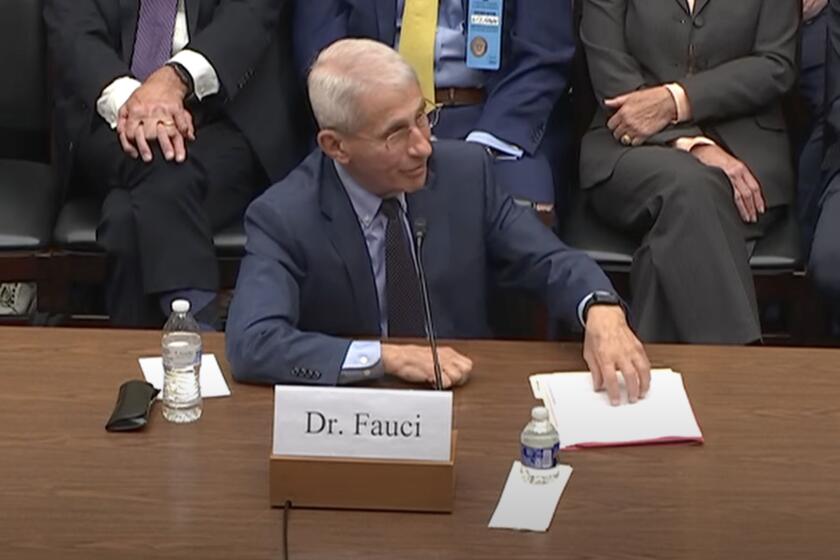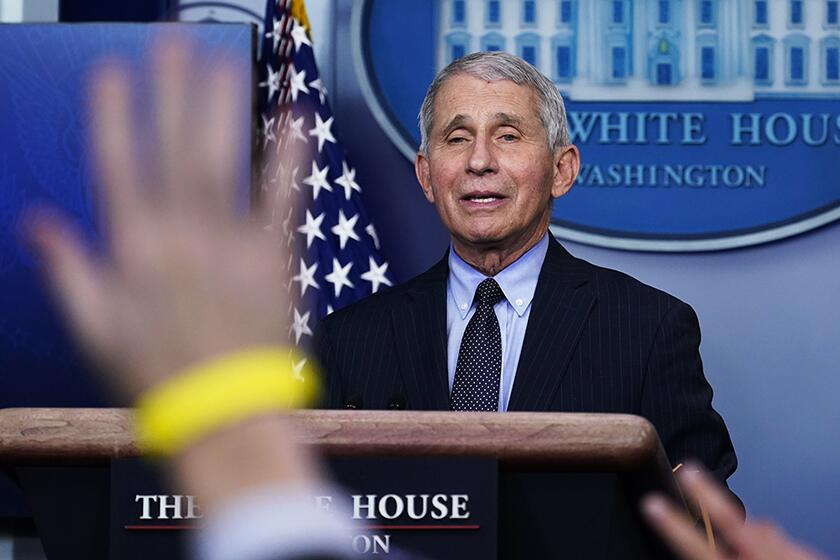Column: Stanford throws a party for purveyors of misinformation and disinformation about COVID

- Share via
We’re living in an upside-down world, aren’t we?
It’s a world in which scientists whose research findings that COVID-19 probably originated as a spillover from wildlife have been validated by dozens of scientific studies, but got them hauled before a Republican-dominated House committee to be brayed at by the likes of Reps. Jim Jordan (R-Ohio) and Marjorie Taylor Greene (R-Ga.) and accused of academic fraud.
Meanwhile, the purveyors of claims that COVID’s danger was overstated and could be met by exposing the maximum number of people to the deadly virus in quest of “herd immunity” have been offered a platform to air their widely debunked and refuted views at a forum sponsored by Stanford University.
This is awful, a full on anti-science agenda (and revisionist history), tone deaf to how this kind of rhetoric contributed to the deaths of thousands of Americans during the pandemic by convincing them to shun vaccines or minimize Covid.
— Vaccine expert and pseudoscience debunker Peter Hotez
The event is a symposium on the topic “Pandemic Policy: Planning the Future, Assessing the Past,” scheduled to take place on campus Oct. 4.
No one can doubt that a sober examination of the policies of the recent past with an eye toward doing better in the next pandemic is warranted. This symposium is nothing like that.
Get the latest from Michael Hiltzik
Commentary on economics and more from a Pulitzer Prize winner.
You may occasionally receive promotional content from the Los Angeles Times.
Most of its participants have been associated with discredited approaches to the COVID pandemic, including minimizing its severity and calling for widespread infection to achieve herd immunity. Some have been sources of rank misinformation or disinformation. Advocates of scientifically validated policies are all but absent.
The event is shaping up as a major embarrassment for an institution that prides itself on its academic standards. It comes with Stanford’s official imprimatur; the opening remarks will be delivered by its freshly appointed president, Jonathan Levin, an economist who took office Aug. 1.
The problem with the symposium starts with its main organizer. He’s Jay Bhattacharya, a Stanford professor of health policy. Bhattacharya is one of the original signers of the “Great Barrington Declaration,” a manifesto for herd immunity published in October 2020. The university didn’t respond to my question about Bhattacharya’s role. He didn’t respond to my request for comment.
The core of the declaration is what its drafters call “focused protection,” which means allowing “those who are at minimal risk of death to live their lives normally to build up immunity to the virus through natural infection, while better protecting those who are at highest risk” — chiefly seniors, who would be quarantined.
The evidence that COVID originated in a lab is still nonexistent, but the controversy undermines trust in science. We’ll be sorry.
Focused protection, the promoters wrote, would allow society to achieve herd immunity and return to normalcy in three to six months.
The quest for herd immunity from COVID has several problems. One is that infection with one variant of this ever-evolving virus doesn’t necessarily confer immunity from other variants. Another problem is that COVID can be a devastating disease for victims of any age. Allowing anyone of any age to become infected can expose them to serious health problems.
Bhattacharya’s name doesn’t appear in the event announcement, but he has identified himself on X as its “main organizer.” Among the announced speakers is epidemiologist Sunetra Gupta of Oxford, another of the declaration’s original signers.
Several other speakers have advocated fewer restrictions on schools and businesses while predicting that COVID would be manageably mild, like the flu — predictions that were consistently and catastrophically wrong.
The date of the symposium, by the way, is the anniversary of the signing of the Great Barrington Declaration. It’s also Rosh Hashanah, one of the High Holy Days of the Jewish calendar. Stanford says the “overlap” with the holiday is regrettable, but it hasn’t offered to reschedule.
Stanford responded to my request for comment about the event by simply reproducing language from the event announcement.
“The conference was organized to highlight some of the many important topics that public health officials and policymakers will need to address in preparing for future pandemics,” the university said. “The speakers, including those already listed and others who will be added over the next several weeks, represent a wide range of views on this issue. We look forward to a civil, informed, and robust debate.”
That won’t do. Stanford’s argument that it’s merely providing a platform for “robust debate” among speakers with a “wide range of views” is belied by the roster of speakers, in which members of a discredited fringe of pandemic policy advocates are heavily overrepresented.
The event announcement has elicited skepticism and dismay among scientists seriously concerned about pandemic policy.
The House GOP attacks Anthony Fauci, one of America’s most accomplished public health officials, labeling him a ‘criminal’ and worse without a speck of substantiation
“Knowing who the speakers and panelists are,” wrote the veteran pseudoscience debunker David Gorski, “I know that ‘assessing the past’ will likely consist of highly revisionist history ... claiming that public health interventions didn’t work.”
The description of some of the daylong symposium’s sessions should give one pause. The precis of a panel titled “Misinformation, Censorship, and Academic Freedom” states as fact that “governments censored information contrary to public health pronouncements in social media settings.” It asks rhetorically, “Does the suspension of free speech rights during a pandemic help keep the population better informed or does it permit the perpetuation of false ideas by governments?”
Yet who among the panel speakers lost their “free speech rights”? On the contrary, several, including Bhattacharya, have ridden their discredited claims to regular appearances on Fox News, op-eds in the Wall Street Journal and appointments to blue-ribbon government committees in red states.
A look at the speakers list should tell you where this event is heading. On a panel titled “Evidence-Based Decision Making During a Pandemic” is Anders Tegnell, the architect of Sweden’s pandemic policy. Sweden has been held up by critics of school closings and lockdowns and advocates of herd immunity as a success story, the theme being that by keeping schools and restaurants open, the country beat the pandemic.
The truth is just the opposite. As I’ve reported, the Tegnell record is disastrous. Sweden’s laissez-faire approach sacrificed its seniors to the pandemic and used its schoolchildren as guinea pigs. Swedish researchers concluded in retrospect that its policies were “morally, ethically, and scientifically questionable.” The death toll rose so high that the government was eventually forced to tighten up the rules.
Sweden’s death rate from COVID was much worse than that of its Nordic neighbors Denmark, Norway and Finland, which all took a tougher approach. If Sweden’s death rate had only matched Norway’s, it would have suffered only about 4,400 COVID deaths, rather than its toll of 18,500.
Then there’s Scott Atlas, a radiologist and former professor at Stanford medical school, who is currently a fellow at the Hoover Institution, the right-wing think tank housed on the Stanford campus.
Atlas was recruited to join the Trump White House as a COVID advisor in July 2020 after having volunteered to Medicare Administrator Seema Verma that the government’s pandemic policies were “a massive overreaction” that was “inciting irrational fear” in Americans.
Richard Ebright and Bryce Nickels of Rutgers have labeled leading virologists fraudsters, perjurers, felons and murderers. Is this how scientific debate is supposed to be conducted?
Atlas estimated that the coronavirus “would cause about 10,000 deaths,” which “would be unnoticed” in a normal flu season. By the end of 2020, as it happens, COVID deaths in the U.S. exceeded 350,000. As of today, the toll is more than 1.2 million.
At the White House, Atlas promoted scientifically dubious prescriptions for the pandemic. He pushed for reduced testing for COVID and dismissed masking as a countermeasure. Most damaging, he called for a herd immunity policy.
Atlas’ prescriptions disturbed his Stanford colleagues, about 110 of whom wrote an open letter in September 2020 alerting the public to “the falsehoods and misrepresentations of science” that Atlas was preaching.
“Encouraging herd immunity through unchecked community transmission is not a safe public health strategy,” they wrote. “In fact, this approach would do the opposite, causing a significant increase in preventable cases, suffering and deaths, especially among vulnerable populations, such as older individuals and essential workers.”
The Stanford administration also formally disavowed Atlas’ statements and prescriptions. “Dr. Atlas has expressed views that are inconsistent with the university’s approach in response to the pandemic,” the university said. “We support using masks, social distancing, and conducting surveillance and diagnostic testing.”
Yet now Atlas appears to be back in the university’s good graces, judging from his presence on the roster. Stanford didn’t respond to my questions about Atlas’ role, and he didn’t reply to my request for comment.
Allowing this symposium to proceed along the lines laid out in the announcement will be a black mark for Stanford in the scientific community.
“What’s happening at Stanford?” asked vaccine expert and disinformation debunker Peter Hotez on X. “This is awful, a full on anti-science agenda (and revisionist history), tone deaf to how this kind of rhetoric contributed to the deaths of thousands of Americans during the pandemic by convincing them to shun vaccines or minimize COVID.”
Stanford’s claim to be a neutral host of a scientific symposium falls short as a fair description of its duties as an academic institution.
No university claims to be open to the expression of any or all views, no matter how unorthodox or counterfactual; they make judgments about the propriety of viewpoints all the time; the level of discernment they practice is one way we judge them as serious educational establishments.
By that standard, Stanford deserves an “F.” On the evidence, neither the university nor its medical school, which is a sponsor of the symposium, exercised any judgment at all before greenlighting an embarrassing gala for the pandemic fringe.
More to Read
Get the latest from Michael Hiltzik
Commentary on economics and more from a Pulitzer Prize winner.
You may occasionally receive promotional content from the Los Angeles Times.














